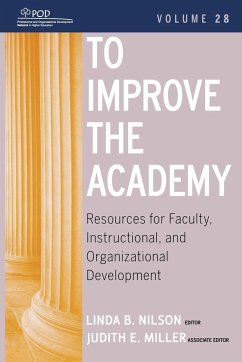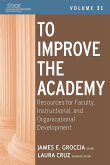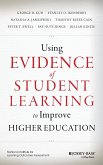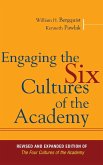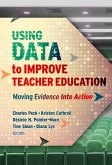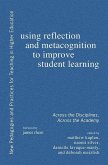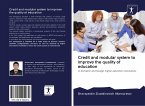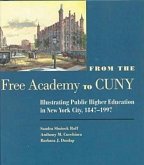To Improve the Academy
Resources for Faculty, Instructional, and Organizational Development
Herausgeber: Nilson, Linda B
To Improve the Academy
Resources for Faculty, Instructional, and Organizational Development
Herausgeber: Nilson, Linda B
- Broschiertes Buch
- Merkliste
- Auf die Merkliste
- Bewerten Bewerten
- Teilen
- Produkt teilen
- Produkterinnerung
- Produkterinnerung
The development of students is a fundamental purpose of higher education and requires for its success effective advising, teaching, leadership, and management. Professional and Organizational Development Network in Higher Education (POD) fosters human development in higher education through faculty, instructional, and organizational development. A smart mix of big-picture themes, national developments, and examples of effective faculty development initiatives from a variety of schools, To Improve the Academy offers examples and resources for the enrichment of all educational developers. This…mehr
![To Improve the Academy To Improve the Academy]() To Improve the Academy44,99 €
To Improve the Academy44,99 €![Using Evidence of Student Learning to Improve Higher Education Using Evidence of Student Learning to Improve Higher Education]() George D KuhUsing Evidence of Student Learning to Improve Higher Education47,99 €
George D KuhUsing Evidence of Student Learning to Improve Higher Education47,99 €![Engaging the Six Cultures of the Academy Engaging the Six Cultures of the Academy]() William H BergquistEngaging the Six Cultures of the Academy59,99 €
William H BergquistEngaging the Six Cultures of the Academy59,99 €![Using Data to Improve Teacher Education Using Data to Improve Teacher Education]() Using Data to Improve Teacher Education133,99 €
Using Data to Improve Teacher Education133,99 €![Using Reflection and Metacognition to Improve Student Learning Using Reflection and Metacognition to Improve Student Learning]() Using Reflection and Metacognition to Improve Student Learning202,99 €
Using Reflection and Metacognition to Improve Student Learning202,99 €![Credit and modular system to improve the quality of education Credit and modular system to improve the quality of education]() Sharapatdin Ziuatdinovich AllamuratovCredit and modular system to improve the quality of education18,99 €
Sharapatdin Ziuatdinovich AllamuratovCredit and modular system to improve the quality of education18,99 €![From the Free Academy to CUNY: Illustrating Public Higher Education in Nyc, 1847-1997 From the Free Academy to CUNY: Illustrating Public Higher Education in Nyc, 1847-1997]() Sandra RoffFrom the Free Academy to CUNY: Illustrating Public Higher Education in Nyc, 1847-199771,99 €
Sandra RoffFrom the Free Academy to CUNY: Illustrating Public Higher Education in Nyc, 1847-199771,99 €-
-
-
Hinweis: Dieser Artikel kann nur an eine deutsche Lieferadresse ausgeliefert werden.
- Produktdetails
- Verlag: Wiley
- Volume 28 edition
- Seitenzahl: 432
- Erscheinungstermin: 1. Oktober 2009
- Englisch
- Abmessung: 229mm x 152mm x 25mm
- Gewicht: 679g
- ISBN-13: 9780470484340
- ISBN-10: 0470484349
- Artikelnr.: 28024090
- Herstellerkennzeichnung
- Produktsicherheitsverantwortliche/r
- Europaallee 1
- 36244 Bad Hersfeld
- gpsr@libri.de
- Verlag: Wiley
- Volume 28 edition
- Seitenzahl: 432
- Erscheinungstermin: 1. Oktober 2009
- Englisch
- Abmessung: 229mm x 152mm x 25mm
- Gewicht: 679g
- ISBN-13: 9780470484340
- ISBN-10: 0470484349
- Artikelnr.: 28024090
- Herstellerkennzeichnung
- Produktsicherheitsverantwortliche/r
- Europaallee 1
- 36244 Bad Hersfeld
- gpsr@libri.de
Preface.
Acknowledgments.
Ethical Guidelines for Educational Developers.
SECTION ONE: Improving Our Performance.
1. Developing Competency Models of Faculty Developers: Using World Café to
Foster Dialogue (Debra Dawson, Judy Britnell, Alicia Hitchcock).
2. A Conceptual Framework for the Center: Going Beyond Setting Priorities (
Sally Kuhlenschmidt, Susan Weaver, Susanne Morgan).
3. A Conceptual Framework for Higher Education Faculty Mentoring (Pamela S.
Lottero-Perdue, Steve Fifield).
4. Strategic Committee Involvement: A Guide for Faculty Developers (
Phyllis Blumberg).
5. A Model for Putting a Teaching Center in Context: An Informal Comparison
of Teaching Centers at Larger State Universities (Wesley H. Dotson, Daniel
J. Bernstein).
6. The Value of the Narrative Teaching Observation to Document Teaching
Behaviors (Niki Young).
SECTION TWO: Understanding Faculty.
7. Promoting Dialogue and Action on Meta-Professional Skills, Roles, and
Responsibilities (Michael Theall, Bonnie Mullinix, Raoul A. Arreola).
8. MacGyvers, Medeas, and Bionic Women: Patterns of Instructor Response to
Negative Feedback (Allison P. Boye, Suzanne Tapp).
9. Conversations About Assessment and Learning: Educational Development
Scholarship That Makes a Difference (Sue Fostaty Young, Susan Wilcox).
SECTION THREE: Understanding Students and Their Learning.
10. Dysfunctional Illusions of Rigor: Lessons from the Scholarship of
Teaching and Learning (Craig E. Nelson).
11. Class Size: Is Less More for Signifi cant Learning? (John Zubizarreta
).
12. Weaving Promising Practices for Inclusive Excellence into the Higher
Education Classroom (María del Carmen Salazar, Amanda Stone Norton,
Franklin A. Tuitt).
13. Communication Climate, Comfort, and Cold Calling: An Analysis of
Discussion-Based Courses at Multiple Universities (Tasha J. Souza, Elise J.
Dallimore, Eric Aoki, Brian C. Pilling).
14. Theoretical Frameworks for Academic Dishonesty: A Comparative Review (
Michele DiPietro).
SECTION FOUR: Enhancing Our Programming.
15. Engaging Faculty in Conversations About Teaching Through a Research
Proposal Workshop (Susanna Calkins, Denise Drane).
16. Developing and Renewing Department Chair Leadership: The Role of a
Teaching Center in Administrative Training (Mary C. Wright, Constance E.
Cook, Chris O'Neal).
17. Rx for Academic Medicine: Building a Comprehensive Faculty Development
Program (Megan M. Palmer, Mary E. Dankoski, Randy R. Brutkiewicz, Lia S.
Logio, Stephen P. Bogdewic).
18. The Case for Excellence in Diversity: Lessons from an Assessment of an
Early Career Faculty Program (Dorothe J. Bach, Mary Deane Sorcinelli).
19. Access to Success: A New Mentoring Model for Women in Academia (Amber
Dailey-Hebert, Emily Donnelli, B. Jean Mandernach).
20. Survivor Academe: Assessing Refl ective Practice (Laurel Johnson Black,
Terry Ray, Judith Villa).
21. Transforming Teaching Cultures: Departmental Teaching Fellows as Agents
of Change (Cassandra Volpe Horii).
Preface.
Acknowledgments.
Ethical Guidelines for Educational Developers.
SECTION ONE: Improving Our Performance.
1. Developing Competency Models of Faculty Developers: Using World Café to
Foster Dialogue (Debra Dawson, Judy Britnell, Alicia Hitchcock).
2. A Conceptual Framework for the Center: Going Beyond Setting Priorities (
Sally Kuhlenschmidt, Susan Weaver, Susanne Morgan).
3. A Conceptual Framework for Higher Education Faculty Mentoring (Pamela S.
Lottero-Perdue, Steve Fifield).
4. Strategic Committee Involvement: A Guide for Faculty Developers (
Phyllis Blumberg).
5. A Model for Putting a Teaching Center in Context: An Informal Comparison
of Teaching Centers at Larger State Universities (Wesley H. Dotson, Daniel
J. Bernstein).
6. The Value of the Narrative Teaching Observation to Document Teaching
Behaviors (Niki Young).
SECTION TWO: Understanding Faculty.
7. Promoting Dialogue and Action on Meta-Professional Skills, Roles, and
Responsibilities (Michael Theall, Bonnie Mullinix, Raoul A. Arreola).
8. MacGyvers, Medeas, and Bionic Women: Patterns of Instructor Response to
Negative Feedback (Allison P. Boye, Suzanne Tapp).
9. Conversations About Assessment and Learning: Educational Development
Scholarship That Makes a Difference (Sue Fostaty Young, Susan Wilcox).
SECTION THREE: Understanding Students and Their Learning.
10. Dysfunctional Illusions of Rigor: Lessons from the Scholarship of
Teaching and Learning (Craig E. Nelson).
11. Class Size: Is Less More for Signifi cant Learning? (John Zubizarreta
).
12. Weaving Promising Practices for Inclusive Excellence into the Higher
Education Classroom (María del Carmen Salazar, Amanda Stone Norton,
Franklin A. Tuitt).
13. Communication Climate, Comfort, and Cold Calling: An Analysis of
Discussion-Based Courses at Multiple Universities (Tasha J. Souza, Elise J.
Dallimore, Eric Aoki, Brian C. Pilling).
14. Theoretical Frameworks for Academic Dishonesty: A Comparative Review (
Michele DiPietro).
SECTION FOUR: Enhancing Our Programming.
15. Engaging Faculty in Conversations About Teaching Through a Research
Proposal Workshop (Susanna Calkins, Denise Drane).
16. Developing and Renewing Department Chair Leadership: The Role of a
Teaching Center in Administrative Training (Mary C. Wright, Constance E.
Cook, Chris O'Neal).
17. Rx for Academic Medicine: Building a Comprehensive Faculty Development
Program (Megan M. Palmer, Mary E. Dankoski, Randy R. Brutkiewicz, Lia S.
Logio, Stephen P. Bogdewic).
18. The Case for Excellence in Diversity: Lessons from an Assessment of an
Early Career Faculty Program (Dorothe J. Bach, Mary Deane Sorcinelli).
19. Access to Success: A New Mentoring Model for Women in Academia (Amber
Dailey-Hebert, Emily Donnelli, B. Jean Mandernach).
20. Survivor Academe: Assessing Refl ective Practice (Laurel Johnson Black,
Terry Ray, Judith Villa).
21. Transforming Teaching Cultures: Departmental Teaching Fellows as Agents
of Change (Cassandra Volpe Horii).

